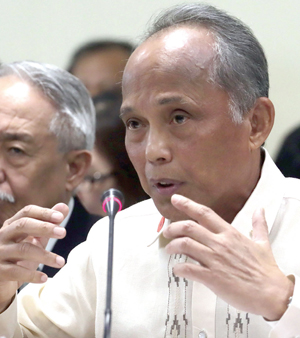DOE to US investors: Explore opportunities in energy sector
By Lenie Lectura -April 16, 2021
from Business Mirror
Energy Secretary Alfonso Cusi
Energy Secretary Alfonso G. Cusi on Thursday called on American investors to take a look at the numerous energy investment opportunities in the Philippines.
During a virtual economic briefing titled “PH-US at 75: Strengthening Ties through Sustainable Recovery,” Cusi presented the energy landscape in the Philippines.
The event was attended by the Philippine Ambassador to the United States of America Jose Manuel G. Romualdez, US Embassy in Manila Charge d’Affaires John C. Law, USAID Acting Administrator Ms. Gloria D. Steele, US International Development Finance Corp. COO David Marchick and Philippine Finance Secretary Carlos G. Dominguez.
Cusi said the country’s goal is to increase the production of clean and indigenous sources of energy, such as geothermal, hydro, and natural gas.
He said that in previous events, Cusi has provided European Ambassadors an overview of the country’s sustainable policy milestones, most of which put the Philippines at par with the competition.
This time, he called the attention of American investors to consider investing in the country’s energy sector.
“I have mentioned this in previous fora I had participated in, and highlighted the same with all the European Ambassadors I have had the chance to speak with. It is unfortunate that the US seems to have forgotten us, so I hope our American friends in the business community will again take a look at our new initiatives that aim to make the Philippines rife with many investment opportunities,” Cusi said.
One of the business opportunities in the Philippine power sector is the Green Energy Option Program (GEOP), where clean energy advocates can source their clean power requirements through Retail Electricity Suppliers (RES).
“I have asked some European Ambassadors in the Philippines to avail of this option for their offices and residences, and although it may be expensive, it is high time that green technology advocates really walk the talk in using renewables,” said Cusi.
Another policy innovation is the Green Energy Auction Program, which will support and facilitate compliance of the Mandated Participants to the Renewable Portfolio Standards’ (RPS) Rules. It also provides an additional market for Renewable Energy (RE) developers with the end view of accelerating greater entry of renewables in the power industry. It will also promote the competitive setting of rates for RE supply.
The DOE is preparing for the conduct of the first auction in June this year. “Again, I want to invite you to participate in these renewable programs.”
Another opportunity cited by the energy chief is in nuclear energy. Cusi said that with the evolution of Small Modular Reactors that are suitable for the off-grid or island areas of the Philippines, the possibility of integrating nuclear power in the country might come as early as 2027.
This, he added, would depend on the passage of necessary legislative policies on nuclear power, which are among the bills that have been certified as urgent, and must be passed by the present Congress.
In July 2020, President Rodrigo Duterte signed Executive Order (EO) 116 that created the Nuclear Energy Program Inter-Agency Committee (NEP-IAC).
The committee submitted its recommendations to the President and is now awaiting his approval.
Prior to the issuance of EO 116, the Philippine Energy Plan already projects the inclusion of nuclear power in the country’s energy mix by 2035.
‘Fuel of the future’
Another investment opportunity is the potential of harnessing hydrogen, considered the “fuel of the future”.
The DOE already signed last January a Memorandum of Understanding (MOU) with Australian development company Star Scientific Ltd.
On top of this, the agency also signed this month a similar MOU with Tokyo-based Hydrogen Technology Inc. (HTI) to explore the use of hydrogen as a fuel for power generation.
Through these MOUs, the Philippine government and these firms would be working together to explore the use of hydrogen as a fuel for power generation.
Cusi urged business leaders to consider participating in the Philippine Conventional Energy Contracting Program.
As of December 2020, the DOE has received a total of 14 applications to explore and develop indigenous energy sources in nominated and new areas. “We’re still waiting for investments that will be coming from US in this area,” said Cusi.
Cusi encouraged investors to explore geothermal opportunities in the country after the Philippines has allowed100 percent foreign ownership in large-scale geothermal exploration, development, and utilization projects.
“Geothermal energy is an area that we would really like to tap and develop. That’s the kind of power we need, and we’d like to see investors from the US doing a 100-percent participation in the development of our geothermal energy.”
During the event, Dominguez also mentioned a plan discussed with the DOE to set up a fund meant to purchase all coal-fired power plants in Mindanao.
Dominguez is the chairman of the Board of state-run Power Sector Assets and Liabilities Management Corp. (PSALM), which owns the Agus-Pulangi facility.
He said Mindanao has sufficient power supply and yet Agus-Pulangi complex has not been maintained over the years and is producing below its capacity.



